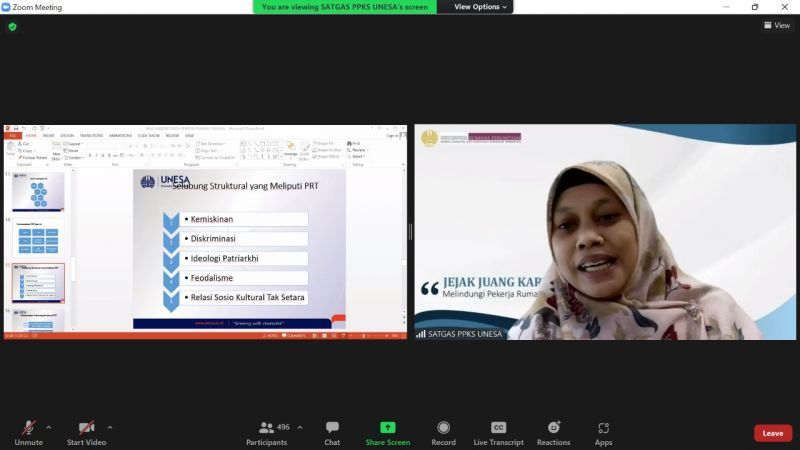
www.unesa.ac.id
Unesa.ac.id, SURABAYA-There are many ways that can be done to commemorate Kartini Day. One of them could be by holding a national discussion “Jejak Juang Kartini; Protecting Domestic Workers” as the UNESA Sexual Violence Prevention and Handling Task Force (PPKS) did online on Saturday, 23 April 2022.
On that occasion, together with a number of resource persons, PPKS highlighted the conditions of domestic workers (PRT) which need to be a common concern. Komnas Perempuan noted that cases of rights violations, violence and torture against domestic workers in Indonesia are still happening. According to 2020 records, there were around 17 cases of domestic workers throughout 2019 that were submitted to Komnas Perempuan.
Hundreds of domestic workers become victims of violence
The National Domestic Worker Advocacy Network (JALA PRT) reported that during 2012 to 2021, more than 400 domestic workers experienced acts of violence in various forms; physical, psychological and economic violence.
“I was once scalded with a pot of hot water, the employer didn't take me to the doctor. They just asked me to soak my feet in a bucket filled with ice water, while my hands were still holding the toddler I was taking care of. I have never received a salary from my employer. They just gave me a big panda doll and some clothes when I said goodbye,” said Ayik, one of the domestic workers, while sobbing in front of the more than 500 participants.
The number of cases that ensnared domestic workers received the attention of the Chancellor of UNESA, Prof. Dr. Nurhasan, M.Kes. Cak Hasan said that the majority of domestic workers were women who had not yet received their rights to work, and not even a few of them received discrimination to violence. "The unequal power between employers and job recipients (PRT, ed) makes workers' positions tend to be objects of violence," he said.
Therefore, the discussion, which was attended by resource persons and the Komnas Perempuan Commissioner, was able to examine more deeply and clearly the various aspects surrounding the condition of domestic workers and later be able to produce solutions for domestic workers. "I hope this discussion has a formula that can be produced to protect domestic workers. Those who work abroad must also be a concern," he hoped.
PPRT Bill is the Solution
Komnas Perempuan Commissioner Theresia Iswarini explained that domestic workers work in positions of vulnerability. Their work has not been fully protected by law, so there must be guarantees, protection and legal certainty contained in the Draft Law on the Protection of Domestic Workers (RUU PPRT).
"Recognition and protection of domestic workers is also a voice of humanity mandated in religious teachings and therefore becomes part of all efforts by religious leaders to ensure that no one is oppressed," he said.
The PPRT Bill so far seems to be tortuous. Since it was first proposed by the DPR in 2004, it has not been ratified to this day. Deputy II of the Presidential Staff Office (KSP), Abetnego Tarigan, stated that currently a task force has been formed for the PPRT Bill as an effort to accelerate the ratification of the bill.
The PPRT Bill is expected to be a guarantee of protection for domestic workers, employers, and employment agency institutions. On that occasion, he greatly appreciated the various elements of society who were enthusiastic in pushing for the ratification of the PPRT Bill as a law.

www.unesa.ac.id
Low Wages Snare Domestic Workers
Head of the PSC Unit. Dr. Mutimmatul Faidah, stated that in addition to violence, many domestic workers get low wages from the workload they bear. Kominfo data, he continued, from 2.6 million domestic workers in Indonesia, 72% of them only get a salary of 300 thousand per month.
Domestic workers are still considered a job that does not require expertise and has no economy. In fact, the task of domestic workers is very heavy and requires its own expertise. “If there are no domestic workers, what will happen to the employer, every job has its own challenges, its own weight and its own expertise. So it should be appreciated," he said.
Veryanto Sitohang, Commissioner of Komnas Perempuan explained the main ideas of the draft PPRT bill, one of which is to encourage the recognition of domestic workers as formal workers to ensure the protection and quality of life of domestic workers. Not only for domestic workers themselves, this PPRT Bill also provides protection for employers aimed at ensuring a balance of rights and obligations in the working relationship between workers and employers.
"Workers have the right to guarantee recognition of protection and fair legal certainty so that the PPRT Bill will create a working relationship that further strengthens family ties, fosters the spirit of mutual cooperation, creates harmony, justice, equality that benefits balance between domestic workers and employers," he said at the end of the event.
Nur Khasanah from JALA PRT who was also present giving testimony expressed her anxiety over the condition of other domestic workers if they had to wait any longer to get proper legal protection. He hopes that this year the PPRT Bill can be passed into law. [UNESA PR]
Author : Mohammad Dian Purnama, Aida and the PPKS team
Editor: @zam*
Share It On:






